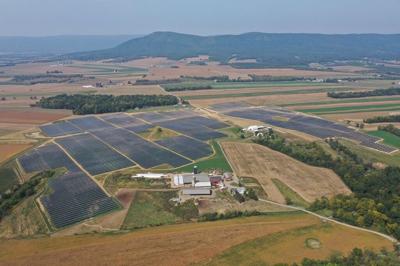As employment opportunities grow in the renewable energy and sustainability fields, Penn State’s various graduate programs focusing on alternative energy options have become increasingly popular.
The Online Intercollege Master of Professional Studies in Renewable Energy and Sustainability Systems curriculum consists of 33 credits and is delivered via Penn State World Campus. The program also offers two graduate certificates, focusing on solar energy and sustainability management policy, respectively.
The RESS master of professional studies degree classification combines the skillsets of typical graduate degrees with “industry-specific skill sets” that are “directly applicable to the workforce,” according to Penn State Energy 2100.
Mark Fedkin, assistant teaching professor and core leading faculty for the RESS program at Penn State, said the program differs from other graduate programs, allowing students to become “well versed in all different types of energy — not just one type.”
“This program is slightly different from the traditional master of science programs that we usually see in academics because it’s heavily focused on practical skills that people would use in industry,” Fedkin said.
Fedkin said the department tries “to tune [itself] toward the job market rather than pure academics,” which in turn is “highly praised by industry representatives.”
“Most of the courses are focused on practical components that provide the necessary technical content and also some background knowledge — in the end, it always converges into some kind of practical assignment or project development,” Fedkin said.
According to Fedkin, the master’s program offers students the flexibility to build their degrees — especially since the program is not “overly prescriptive.”
“We have core courses that everyone takes, and we have capstone experiences where students are engaged in the group project and work with real stakeholders to develop a proposal for a company or client for implementation of renewable energy or sustainability measures,” Fedkin said.
Additionally, Fedkin said the program allots space for electives and track courses that students enroll in based on their interests.
Derek Hall is an assistant professor in the John and Willie Leone Family Department of Energy and Mineral Engineering, who teaches a core RESS class as well as energy engineering undergraduate work. Hall said the program teaches students an array of information to help them in the ever-changing job market.
“The goal is different for this course compared to others, and the content is a little unique as well,” Hall said. “The renewable space is quite large, so I think our ability to capture the essence of each of them in small portions while still informing the student about all these emerging technologies is especially nice and unique with the RESS program.”
MORE CAMPUS COVERAGE
Sitting on the HUB-Robeson Center lawn in 70 degree weather on a sunny April wellness day, s…
The program allows students to obtain the “breadth of information” of the various renewable energy fields that help them enlarge their expertise and abilities, Hall said.
Hall said he enjoys the course he teaches because “it’s essentially the whole energy engineering program crunched down into one course,” meaning students learn pieces of each alternate energy option.
“In most traditional graduate programs, you just pick one thing to focus on and become an expert in that — go to the depths,” Hall said. “But here, we still capture part of the undergraduate framework where we show them all these different technologies and how they relate to each other.”
The renewable energy market is broad and changes often, according to Hall, so educators never know what information will become “valuable” over each student’s individual occupational careers.
Therefore, Hall said the program is designed to teach about the various renewable energy options in order to better prepare students for their futures — regardless of the path they decide to take.
Hall said seeing previous energy engineering undergraduate students enrolled in the master’s program is a “happy experience.
According to Fedkin, who helps review RESS program applications, the department has seen increased undergraduates entering the master’s program directly after finishing their undergraduate studies, especially from Penn State campuses.
However, Fedkin said he didn’t know if the “trend” was caused by the “changing job market” with the growth of renewable energy or the general difficulty some have faced while job hunting during the pandemic.
Fedkin said the last year has been “hard” since the department’s been “coping with a surge” of new applicants. He said the department received double the typical application numbers in the fall and triple the typical application numbers for the spring application period.
“It was a very fast growth, and it’s given us some troubles because we wanted to place our students into the correct courses, but the courses filled up so quickly that we weren’t even able to open up additional sections,” Fedkin said.
Fedkin said having increased application numbers “is a good problem to have” since it shows great interest in both the program and renewable energy efforts.
Benjamin Eller, a first-year graduate student enrolled in the RESS program, said he decided to attend Penn State for graduate work due to the university’s well-established reputation and the wide scope of focus within the RESS program.
“I liked how the courses commingle a little bit and you don’t have to stay directly on a particular track,” Eller said. “I also like the reach that Penn State has since it’s such a really big and well-known school.”
MORE CAMPUS COVERAGE
Beginning on Thursday, April 22 through April 24, Penn State is partnering with Walmart to o…
Eller said the asynchronous aspects of the program are beneficial, especially since he has a busy schedule balancing both work and academic obligations.
“Since the classes are asynchronous, they let you work at your own pace — you can go back and review if you need to, you can do an hour here and an hour there, and the assignments are due at the end of the week, which I enjoy because I can take my time,” Eller said.
Eller said he decided to enroll in the graduate program during the pandemic because working as a solar energy sales consultant made him consider his options and what would be “beneficial [for him] further down the line.”
According to Fedkin, while many people do apply for the renewable energy graduate program, there are other routes of academic study as well.
Before committing to the intensive 33-credit program, some students begin by participating in a graduate certificate program, gaining “small credentials first that can then be transferred to the master’s program later,” Fedkin said.
After finishing the educational program, RESS graduates have a broad range of applicable job opportunities, and there’s not one clear path for all students, Fedkin said.
“In the past, you would finish your nuclear engineering degree, and you’d go and work in a nuclear energy plant. If you were a chemical engineer, you’d know the companies that were going to hire you. But that’s already not the case for many majors,” Fedkin said. “Many majors don’t have that clear path anymore. It’s so very blended and a lot is built on interfaces and between disciplines.
According to Fedkin, solar companies have expanded exponentially over the last few years. Consequently, the graduate department sees alumni taking jobs from that growing market.
“This program is not focused only on one technology, but a whole area of skills that relate to energy business,” Fedkin said. “So, it’s not only how solar works or how wind works, but also what you need to know to apply that technical knowledge and development of the real project.”
Fedkin said graduate students in the RESS program typically end up “all across the energy sector in a very broad variety of disciplines” due to the “very holistic” nature of the program.
“I think many companies have started understanding the value of that sort of education,” Fedkin said.
MORE CAMPUS COVERAGE
On Feb. 9, the Center for Sexual and Gender Diversity announced it would be renamed after al…
Besides the RESS program, renewable energy graduate minors and certificates also exist through Penn State’s World Campus and University Park, according to Penn State Energy 2100.
For instance, a 9-credit graduate certificate in wind energy is administered at the University Park campus to address wind energy development projects.
Susan Stewart, an associate teaching professor in charge of the graduate certificate in wind energy, said the United States Department of Energy promoted energy certificates and programs — like those at Penn State — because “they projected huge demand for trained people in the renewable energy industry.”
“My hope is that a lot more people sign up for the certificate so we can keep it going, because if we don’t have the demand, we can’t keep it going and can’t be offering it,” Stewart said.
Stewart said the renewable energy industries — especially the wind energy market — has been growing in recent years. However, she said many students have trouble finding the heavily available jobs within the industries.
“The industry needs people. Universities are educating people, but they are not finding each other necessarily. There’s a workforce gap,” Stewart said. “There’s been a good bit of effort over the last few years to help the industries find the folks they are looking for.”
According to the U.S. Bureau of Labor, wind and solar industries are classified as some of the top projected fields for growth over the next 10 years, specifically between 2019-2029.
“There’s going to be a ton of growth in wind energy in the future. Off-shore wind is really just beginning to take off,” Stewart said.
Stewart said the Biden administration recently announced a plan to accelerate offshore wind energy projects in the coming years, and these plans will provide jobs for those studying renewable energy.
“There’s going to be a lot of growth in the future, and they’re going to need people,” Stewart said. “My hope is just that the industry is looking for programs like ours to hire folks from.”








